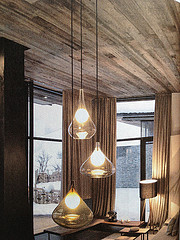Handle Reclaimed Wood with Care
 Reclaimed wood is a hot trend in household decor nowadays ... and for good reason. This unique building material glows with a special aged patina. Wood cut from fully mature trees, as was the practice years ago, also offers superior strength and extra-large board size. What's more, reusing vintage wood is an environmentally friendly practice. However, reclaimed wood does have its downside. Whether you are purchasing repurposed wood from a supplier or salvaging it yourself, check out this guide to potential problems – and their fixes.
Reclaimed wood is a hot trend in household decor nowadays ... and for good reason. This unique building material glows with a special aged patina. Wood cut from fully mature trees, as was the practice years ago, also offers superior strength and extra-large board size. What's more, reusing vintage wood is an environmentally friendly practice. However, reclaimed wood does have its downside. Whether you are purchasing repurposed wood from a supplier or salvaging it yourself, check out this guide to potential problems – and their fixes.
1. PROBLEM: Dirt. Reclaimed wood often shows the signs of decades of use. Prime among them are dirt and dust.
FIX: Have the lumber cleaned by your supplier or pressure wash it yourself.
2. PROBLEM: Mold and mildew. If wood has been exposed to excessive moisture over the years, mold and mildew may result. This can lead to serious respiratory problems, especially in children, asthmatics or frail individuals.
FIX: Wash with bleach solution, using gloves and preferably a face mask. Dry thoroughly. Do not use for food service, kid’s furniture or toys.
3. PROBLEM: Nails and other metal objects. Reclaimed wood often contains old nails, metal pegs or even bullets. These are dangerous to your hands, causing scrapes and cuts, as well as putting you at risk for tetanus if they are rusty. These objects can be even more hazardous if you hit them with a power saw.
FIX: Handle reclaimed wood with work gloves. Before cutting with a power saw, go over it with a stud finder or metal detector.
4. PROBLEM: Splinters. Wood splinters are less serious than the previous hazards, but can still be painful and annoying.
FIX: Once again, work gloves are strongly recommended.
5. PROBLEM: Wood-eating pests. Termites and the like are not harmful to humans. However, they can do a great deal of damage to your reclaimed lumber, not to mention other wooden items in your home.
FIX: If you see any signs of termites – the insects themselves, holes, or a crumbly texture to the wood – the lumber must be kiln dried to kill infestation.
6. PROBLEM: Lead paint. Paint applied to your wood prior to 1978 may contain lead, which causes serious health problems when inhaled or ingested.
FIX: Have a sample of the paint laboratory tested or call in a certified inspector to check it with an x-ray fluorescence machine. If there is a hazardous level of lead in the paint, contact your local health department for instructions on how to deal with it.
7. PROBLEM: Serious stains. Reclaimed wood, notably pallet wood, may be badly stained or marked with oil. It may, in addition, have an unpleasant odor.
FIX: Avoid purchasing or using such wood.
8. PROBLEM: Warping and bending: Wood that has warped or bent over time will be difficult to fit properly.
FIX: Millwork will correct the problem. For a long-term fix, kiln drying is the best solution.
9. PROBLEM: Dryness: Wood is an organic substance, which naturally becomes dryer with age, especially in an arid state like Nevada.
FIX: Treat your Las Vegas wood flooring with care, working slowly to install it.
10. PROBLEM: Holes. Knotholes and other types of holes may be found in reclaimed lumber.
FIX: You can repair the holes with wood filler. However, if you are planning to stain the wood, a handy fix is filling them with toothpicks or golf tees, cut to size; these will absorb the stain and give the piece a more uniform appearance.
11. PROBLEM: Minor stains and signs of wear. Less serious stains, markings and signs of wear are common in “well loved” reclaimed wood.
FIX: Sand and oil the affected area … or just live with the imperfections as part of the quirky charm of reclaimed wood.
12. PROBLEM: A dishonest reclaimed wood dealer. While not a problem with the lumber per se, the popularity of reclaimed wood has led to some shady dealers in the marketplace today.
FIX: Before making your purchase, verify that the dealer is certified by the Forest Stewardship Council or the Rainforest Alliance. Be sure to obtain a guarantee on any materials you buy.
Laura Firszt writes for networx.com.
Updated March 19, 2018.
Looking for a Pro? Call us (866) 441-6648

Average Costs
Related Experiences

My Deck Repair Was Simple But Perfect

We Finally Extended Our Concrete Patio And Our Yard Looks Amazing



